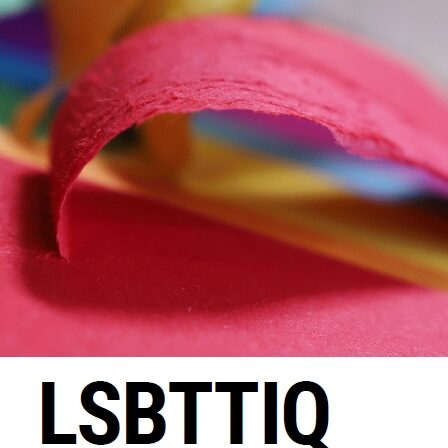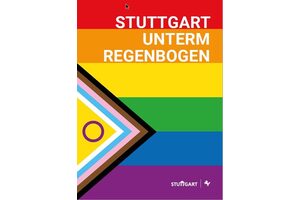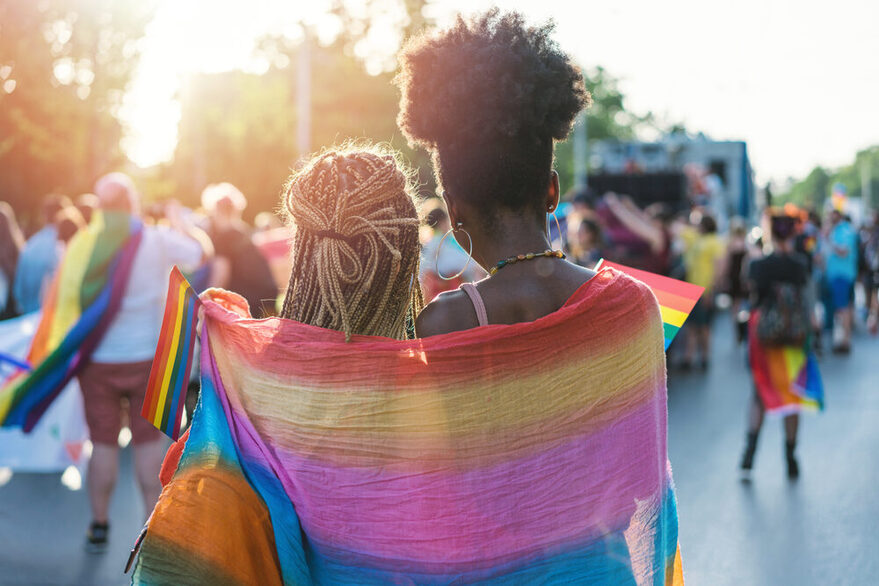Das Leben ist bunt – Stuttgart auch!
In enger Zusammenarbeit mit Organisationen und Initiativen der Regenbogen‐Communities und den städtischen Fachämtern setzt die Stadt Stuttgart Maßnahmen für mehr Akzeptanz, Sichtbarkeit und Sicherheit für lesbische, schwule, bisexuelle, trans*, intergeschlechtliche, nicht‐binäre und queere (LSBTIQ+) Menschen um.
LSBTIQ+ Beratung‐ und Bildungsangebote
Die Landeshauptstadt Stuttgart fördert verschiedene Beratungsangebote für lesbische und queere Mädchen und Frauen, für schwule, bisexuelle und queere Jungen und Männer, für trans*, intergeschlechtliche und auch nicht‐binäre Menschen. Träger der Beratungsstellen sind das Frauenberatungs‐ und Therapiezentrums Stuttgart e.V. (Fetz) (Öffnet in einem neuen Tab) und der Weissenburg e.V. (Öffnet in einem neuen Tab)
Das Regenbogen Refugium des Weissenburg e. V. (Öffnet in einem neuen Tab) bietet Begegnung und Vernetzung von LSBTTIQ Geflüchteten und deren Unterstützer*innen. Zweimal im Monat findet in Kooperation mit amnesty international Stuttgart eine Beratung für LSBTTIQ‐Geflüchtete statt.
Das Projekt Regenbogen.Bildung (Öffnet in einem neuen Tab) bietet im Raum Stuttgart Workshops zum Thema Vielfalt von Lebensweisen, sexueller Orientierung und Geschlecht an Die Workshops mit geschulten queeren Jugendlichen richten sich an Schulen, Jugendhäuser und andere Einrichtungen.
Bei der Türkische Gemeinde in Baden‐Württemberg (tgbw) ist die „Fachberatung geschlechtliche und kulturelle Vielfalt Stuttgart“ (Öffnet in einem neuen Tab) als wichtige Ergänzung zu anderen Beratungsangeboten aus der LSBTIQ+ Communities und dem Gesundheitswesen angesiedelt. Sie richtet sich speziell an LSBTIQ+ mit internationaler Geschichte und/oder Rassismuserfahrungen.
BerTA – Beratung, Treffpunkt und Anlaufstelle für Regenbogenfamilien (Öffnet in einem neuen Tab) des LSVD Baden‐Württemberg in Stuttgart hat ein breites Angebotsspektrum für Regenbogenfamilien und auch Rainbow‐teens.

Weitere Beratungs‐ und Unterstützungsmöglichkeiten in Stuttgart sind im beigefügten Flyer aufgeführt. Sie können den Flyer herunterladen, indem Sie auf das Bild klicken.
Download Broschüre: Stuttgart unterm Regenbogen
Die Broschüre „Stuttgart unterm Regenbogen“ wurde 2022 gemeinsam mit der Organisation Projekt 100% MENSCH gUG entworfen. Sie bündelt vielfältige Anknüpfpunkte und Beteiligungsmöglichkeiten für Interessierte.
Der Erstellungsprozesses hat sich uns einmal mehr gezeigt, wie vielfältig die queeren Communities der Stadt Stuttgart sind und wie wichtig es ist, diese Diversität sichtbarer zu machen.
Queere Organisationen, Initiativen und Vereine, die bisher noch nicht in der Broschüre gelistet sind, können gern Kontakt mit der Abteilung für Chancengleichheit aufnehmen. Gedruckte Exemplare werden auf Anfrage versand.

Der Arbeitskreis LSBTIQ+ Stuttgart
Der Arbeitskreis LSBTIQ+ der Landeshauptstadt Stuttgart ist ein zentrales Vernetzung‐ und Arbeitsgremium, in dem Maßnahmen für mehr Akzeptanz, gesellschaftliche Achtung und Teilhabe von allen Menschen, ungeachtet der sexuellen und geschlechtlichen Identität erarbeitet werden.
Das Ziel des Arbeitskreises ist es, besondere Bedarfe aber auch Benachteiligungen von lesbischen, schwulen, bisexuellen, trans*, intergeschlechtlichen und queeren Menschen (LSBTIQ+) sichtbar zu machen und gemeinsam mit verschiedenen Fachabteilungen Lösungsstrategien für mehr Teilhabe und Mitgestaltung zu erarbeiten. Das “+“ im Namen schließt zum Beispiel nicht‐binäre, agender Personen mit ein. Zu wichtigen Projekten und Aktionen des Arbeitskreises zählen unter anderem:
- Die Etablierung und Institutionalisierung von spezifischen Beratungsangeboten für LSBTIQ+ in Stuttgart.
- Die Regenbogenfamilientage im Rathaus und die Verankerung des Angebots „BerTA – Treffpunkt, Fach‐ und Beratungsstelle für Regenbogenfamilien in Stuttgart“.
- Die Einweihung des Karl Heinrich Ulrich Platzes und der Karl Heinrich Ulrich Stele.
- Die Verankerung des Themas sexuelle Orientierung und geschlechtliche Vielfalt in vielen verschiedenen Veranstaltungsformaten, wie zum Beispiel als Kooperationspartner bei den Fachtagen der AG Gender zur geschlechtersensiblen Arbeit in Stuttgart.
- Die Sichtbarkeit des Themas „sexuelle Orientierung und geschlechtliche Vielfalt“ in politischen Gremien durch sachkundige Einwohner*innen sowie beratende Mitglieder, zum Beispiel im Jugendhilfeausschuss, im Beirat für Gleichstellungsfragen und im Internationalen Ausschuss.
- Die Erarbeitung von Informationsmaterialien zu spezifischen Themen
Öffentliche Veranstaltungen, zum Beispiel im Rahmen der CSD Kulturwochen, Lesungen und Talkrunden, Ausstellungen und Aufklärungsarbeit.
Mitglieder des AK LSBTIQ+
Fachämter und Fachabteilungen der Stadt Stuttgart
Abteilung für Chancengleichheit
Abteilung Integrationspolitik
ELW – Eigenbetrieb leben & wohnen
Gesundheitsamt
Haupt‐ und Personalamt
Jugendamt
Kulturamt
Amt für Soziales und Teilhabe
Institutionen und Organisationen aus dem LSBTTIQ Bereich
Abseitz Stuttgart e.V. (Öffnet in einem neuen Tab)
AIDS‐Hilfe Stuttgart e.V. (Öffnet in einem neuen Tab)
Fetz e.V. Frauenberatungs‐ und Therapiezentrum Stuttgart (Öffnet in einem neuen Tab)
Stuttgart PRIDE – CSD Stuttgart e.V. (Öffnet in einem neuen Tab)
LSVD e.V. Lesben‐ und Schwulenverband Landesverband Baden‐Württemberg (Öffnet in einem neuen Tab)
Mission TRANS* e. V. Stuttgart (Öffnet in einem neuen Tab)
Projekt 100 % MENSCH gUG Stuttgart (Öffnet in einem neuen Tab)
Wirtschaftsweiber e.V. Regionalgruppe Stuttgart (Öffnet in einem neuen Tab)
Weissenburg e.V. – Zentrum LSBTTIQ Stuttgart (Öffnet in einem neuen Tab)
Sonstige
Initiative Lern‐ und Gedenkort Hotel Silber e.V. (Öffnet in einem neuen Tab)
Just Human e.V. (Öffnet in einem neuen Tab)
Pro Familia – Beratungsstelle Stuttgart (Öffnet in einem neuen Tab)
Stadtjugendring Stuttgart e.V. (Öffnet in einem neuen Tab) (Facharbeitskreis Jungen)
Die Türkische Gemeinde Baden‐Württemberg e.V. (Öffnet in einem neuen Tab)
Das Statistische Landesamt Baden‐Württemberg (Familienforschung) (Öffnet in einem neuen Tab) berät als Kooperationspartner mit wissenschaftlicher Expertise den Arbeitskreis LSBTTIQ.
Das „Gesetz über die Selbstbestimmung in Bezug auf den Geschlechtseintrag“ – kurz „Selbstbestimmungsgesetz“ (SBGG)

Das „Gesetz über die Selbstbestimmung in Bezug auf den Geschlechtseintrag“ – kurz „Selbstbestimmungsgesetz“ (SBGG) soll es trans*, intergeschlechtlichen und nicht‐binären Menschen ermöglichen, ihren Namen und den Personenstand entsprechend ihrem Geschlecht ändern zu lassen, wenn der mit dem nach der Geburt erfolgte Geschlechtseintrag nicht dem eigenen Geschlecht übereinstimmt.
Bisher erfolgte die amtliche Personenstands‐ und Namensänderung nach dem seit 1981 geltenden „Transsexuellengesetz“(TSG). Dieses Gesetz war mit hohen bürokratischen Hürden verbunden (zwei psychologische Gutachten und ein Gerichtsverfahren), sehr langwierig und auch teuer. Für die Betroffenen war dieses Verfahren großem Leidensdruck verbunden.
Weltweit gibt es bereits einige Länder mit ähnlichen gesetzlichen Grundlagen. Argentinien ist das erste Land, in dem seit 2012 eine Namens‐ und Personenstandsänderung durch Selbsterklärung möglich ist. Weitere Länder sind Chile, Malta, Dänemark, Luxemburg, Belgien, Irland, Portugal, Island, Neuseeland, Norwegen, Uruguay, Schweiz, Spanien und Finnland.
Was bedeutet Geschlechtsidentität?
Der Begriff „Geschlechtsidentität“ drückt aus, mit welchem Geschlecht sich eine Person identifiziert. Die Geschlechtsidentität eines Menschen muss nicht mit dem bei der Geburt zugewiesenen Geschlecht übereinstimmen. Es gibt eine Vielzahl von Geschlechtsidentitäten, die über das traditionelle Verständnis von eindeutig „männlich“ und „weiblich“ hinausgehen, unter anderem:
trans* / cis
Als trans* bezeichnen sich Menschen, die sich nicht oder nicht ausreichend mit dem bei der Geburt zugewiesenen Geschlecht beschrieben wissen. Zugewiesenes Geschlecht und Geschlechtsidentität sind also nicht kongruent. Das Gegenstück zu „trans*“ ist „cis“. Eine Person, die sich mit dem nach der Geburt zugewiesenen Geschlecht identifiziert, ist cis.
nicht‐binär
Menschen, die sich weder ausschließlich als männlich oder weiblich identifizieren, sich außerhalb des binären Geschlechtersystems verorten oder für die die Kategorie „Geschlecht“ keine Bedeutung hat, bezeichnen sich als nicht‐binär.
intergeschlechtlich/endogeschlechtlich
als intergeschlechtlich bezeichnen sich Menschen, deren körperliche, chromosomale, genetische und/oder hormonelle Geschlechtsmerkmale nicht den medizinischen/gesellschaftlichen Erwartungen von eindeutig männlich oder weiblich entsprechen. Bei intergeschlechtlichen Menschen sind diese uneindeutig und mehrdeutig.
Menschen, deren Geschlechtsmerkmale eindeutig den medizinischen/gesellschaftlichen Erwartungen von weiblich bzw. männlich entsprechen, werden als endogeschlechtlich bezeichnet.
Beratungs‐ und Anlaufstellen in Bezug auf das SBGG in Stuttgart
- Beratung der Weissenburg, Sophienstraße 26, 70178 Stuttgart, beratungzentrum‐weissenburgde, Tel: 0711 400 530 10 , Instagram: @weissenburgstuttgart
- Mission TRANS* e.V. Koordinationsstelle Trans* Stuttgart, infomission‐transde, koordinationsstelle‐transmission‐transde, Instagram: @mission_trans, https://mission‐trans.de/community/selbsthilfegruppen/ (Öffnet in einem neuen Tab)
- Angebot für Austausch und Vernetzung für Fachpersonen in Stuttgart: https://fachkreistransstuttgart.wordpress.com/ (Öffnet in einem neuen Tab)
Queer im Alter
Seit vielen Jahren arbeiten die Mitglieder des AK LSBTIQ+ an unterschiedlichen Fragestellungen zum Thema „Queer im Alter“.
„Wie ist´s im Alter, wenn ich queer bin?“ war beispielsweise der Titel einer Veranstaltung im Rahmen der CSD Kulturwochen 2023. 2024 machten sich die Veranstalter*innen gemeinsam „Auf den Weg zu einer queersensiblen Pflege‐ / Senior*inneneinrichtung“. Es wurde deutlich, dass gelebte Offenheit für Vielfalt einer Gesamtstrategie, einer richten Sprache sowie Mut und Vorbilder von Leitung über Mitarbeitende bis hin zu Bewohner*innen bedarf.
Die Ergebnisse flossen in einen Flyer mit Handlungsempfehlungen für Pflegeeinrichtungen ein, der nachfolgend als Download zur Verfügung steht.
Ebenfalls bieten die Mitglieder unter Koordination der Türkischen Gemeinde in Baden‐Württemberg (Öffnet in einem neuen Tab) Workshops für Fachkräfte, die in Pflegeberufen arbeiten, und Auszubildende in Pflegeberufen an.
Das Pilotprojekt mit drei CSD Partykoffern für Pflegeeinrichtungen des Eigenbetriebs leben & wohnen (Öffnet in einem neuen Tab)ermöglichte bunte Veranstaltungen in drei Einrichtungen mit queeren Künstler*innen während der CSD Kulturwochen 2024, zum Beispiel ein Drag‐Bingo Nachmittag im Zamenhof (Öffnet in einem neuen Tab).
In diesem Jahr widmen sich die Teilnehmenden des AK LSBTIQ+ dem Thema queere ambulante Pflege und laden herzlich ein zur diesjährigen Veranstaltung am 15. Juli 2025 im Rahmen der CSD Kulturwochen „Queer im Alter – Ambulant, bunt, sensibel – Vielfalt in der Pflege“ ein interaktiver Abend zum Mitdenken, Mitreden und Mitgestalten.“
Geschlechtersensible Arbeit
Gremienarbeit AG Mädchen*politik, Fach AK Jungen*arbeit, AG Gender
In Stuttgart gibt es eine breite Palette an Angeboten für Mädchen* und Jungen*. Diese entwickeln sich, je nach gesellschaftlichem und politischem Kontext, stetig weiter. Alle Stuttgarter Träger der Kinder‐ und Jugendhilfe, sowie viele andere Organisationen, die Angebote für Kinder und Jugendliche anbieten, haben sich darauf verständigt, ihre Arbeit an den „Leitlinien der Kinder‐ und Jugendhilfe zur geschlechtersensiblen Arbeit mit Mädchen*, Jungen* und lsbttiq‐Kindern und ‐Jugendlichen in Stuttgart“ (s. Downloadbereich) auszurichten.
Die AG Gender ist ein Fachgremium, unter der Leitung der Jugendhilfeplanung, sind Mitglieder aus der AG Mädchen*politik und dem Fach AK Jungen*arbeit Stuttgart delegiert. Das Fachgremium hat einen beratenden Sitz im Jugendhilfeausschuss nach § 9 KJHG heute SGB VIII und § 78 und 80 KJHG .
Alle zwei Jahre findet der Fachtag der AG Gender in Kooperation mit dem AK LSBTIQ+ Stuttgart statt. Hier werden Praxisthemen der geschlechtersensiblen Arbeit aufgegriffen und gemeinsam Handlungsfelder und Lösungsmöglichkeiten entwickelt.
Die AG Mädchen*politik und der Fach AK Jungen*arbeit veranstalten einmal jährlich in Zusammenarbeit mit der Abteilung Chancengleichheit eine Jugendstadtrallye – Empowerment für alle Geschlechter, bei der Jugendliche der Klassenstufen 8/9 spielerisch und niedrigschwellig die geschlechtersensiblen Angebote der Stuttgart Kinder‐ und Jugendhilfe kennen lernen. Eine Übersicht über die beteiligten Angebote kann im Downloadbereich eingesehen werden.
Queere Erinnerungsarbeit
Der Tag des Gedenkens an die Opfer des Nationalsozialismus am 27. Januar ist in Deutschland seit 1996 ein bundesweiter, gesetzlich verankerter Gedenktag, der mittlerweile in vielen Staaten Europas begangen wird. Erst in den letzten Jahren konnte mit der Einbeziehung von sexuellen und geschlechtlichen Minderheiten in der öffentlichen Erinnerungskultur begonnen werden. Dennoch bleibt es wichtig, Erinnerungskultur jenseits von Opferhierarchien zu leben. Auf kommunaler und Landesebene sind in diesem Zeitraum verschiedenen Initiativen realisiert worden, wie z. B. die Gedenkstunde im Landtag von Baden‐Württemberg (Öffnet in einem neuen Tab). (Die Aufzeichnungen der Gedenkveranstaltungen sind hier abrufbar).
Gemeinsam mit vielen Beteiligten, finden über das ganze Jahr verteilt zahlreiche Kooperationsveranstaltungen, wie z. B. im Rahmen des Gedenktages am 27. Januar oder während der CSD Kulturwochen, zum Transgender Day of Remembrance, zum Tag der lesbischen Sichtbarkeit statt, um zu erinnern aber auch um Zukunft zu gestalten.
Auswahl an Projekten und Kooperationen
Eine Übersicht an aktuellen städtischen Kooperationen und geförderten Projekten in den LSBTIQ+ Communities finden Sie hier.
Regenbogenhaus in Stuttgart
Vielfältige Sichtweisen und Impulse im Rahmen einer breit angelegten Projektstudie, gefördert von der Landeshauptstadt Stuttgart, durchgeführt vom Weissenburg e. V. – Zentrum LSBTIQA+ Stuttgart, sollen dazu beitragen, dass ein Regenbogenhaus in Stuttgart (Öffnet in einem neuen Tab) ein attraktiver Ort für viele Menschen und Gruppen aus den queeren Communities wird.
Ein Regenbogenhaus als einen offenen Ort der Begegnung, des Austauschs, der vielfältigen Kultur und kurzer Arbeits‐ und Kommunikationswege für haupt‐und ehrenamtlich Engagierte, einen diskriminierungsarmen Raum an dem Inklusion und Barrierefreiheit selbstverständlich sind, der gleichzeitig persönliche Beratung und verlässlichen Schutz anbietet.
Die Projektidee Regenbogenhaus Stuttgart wurde vom städtischen Arbeitskreis LSBTIQ+ aufgegriffen und wird nun als gemeinsames Community‐Projekt weiterentwickelt.
Das Regenbogenhaus soll einen Beitrag leisten, Stuttgart als weltoffene, solidarische und vielfältige Stadt mit Mut und Engagement weiter voranzubringen und den Dialog und die Begegnung mit anderen Gruppen jenseits der queeren Communities fördern. Weitere Informationen unter: www.regenbogenhaus‐stuttgart.de
Regenbogenfamilien in Stuttgart
Die Abteilung für Chancengleichheit unterstützt die Entwicklung familienfreundlicher Strukturen für vielfältige Familienformen (Öffnet in einem neuen Tab) in der Landeshauptstadt. So wurden beispielsweise bei den Regenbogenfamilientagen im Rathaus 2014, 2015 und 2018 spezielle Bedürfnisse von Familien zur Sprache gebracht, in denen mindestens ein Elternteil lesbisch, schwul, bisexuell, trans*, intergeschlechtlich oder nicht‐binär ist.
Seit 2020 fördert die Landeshauptstadt fördert „BerTA – Beratung, Treffpunkt und Anlaufstelle für Regenbogenfamilien des LSVD Baden‐Württemberg“ (Öffnet in einem neuen Tab) in Stuttgart. Das umfangreiche Wissen des BerTA Teams ist auch eine große Unterstützung für Multiplikator*innen und Fachkräfte.
WAPOC – WE ARE PART OF CULTURE in Stuttgart
Seit Anfang 2020 bis Ende 2023 wanderte die Kunstausstellung WE ARE PART OF CULTURE 2020/2021 (Öffnet in einem neuen Tab) mit Portraits von über 30 queeren Persönlichkeiten durch öffentliche Räume der Landeshauptstadt. Um einen Besuch der Ausstellung ortunabhänig zu ermöglichen, haben sich das kuratierende Projekt 100% MENSCH (Öffnet in einem neuen Tab)und die Abteilung für Chancengleichheit der Stadt Stuttgart entschlossen, die Kunstausstellung kurzerhand ins Internet zu verlegen.
Seit dem Internationalen Tag gegen Homo‐, Bi‐, Inter‐, und Transfeindlichkeit am 17. Mai 2021 sind die Kunstwerke und Lebensgeschichten auf der Website der Landeshauptstadt zu finden und laden zum Stöbern und Staunen ein.
Hinweis: Diese Kunstausstellung ist für CHROME Browser optimiert. Aufgrund der detalierten Bilder empfehlen wir den Besuch von einem Desktoprechner – mobil stehen einige Funktionen nur eingeschränkt zur Verfügung. Klicken Sie zunächst auf ein Portrait und für weitere Informationen auf den grauen Kreis neben dem Pfeil unter dem jeweiligen Portrait. Viel Vergnügen beim Besuch der WE ARE PART OF CULTURE!
Dokumentenarchiv
- GRDrs 42/2023 Arbeitsergebnisse 2021/2022 Koordinierungsstelle Gender / LSBTTIQPDF‐Datei1,10 MB
- GRDrs 132/2021 Arbeitsergebnisse 2019/2020 Koordinierungsstelle Gender / LSBTTIQPDF‐Datei1,69 MB
- GRDrs 50/2019 Bericht Themengebiet sexuelle Orientierung / geschlechtliche VielfalPDF‐Datei1,27 MB
- GRDrs 355/2017 Bericht Themengebiet sexuelle Orientierung / geschlechtliche VielfaltPDF‐Datei1,70 MB
- Flyer AG Mädchen*politik Stuttgart 2020PDF‐Datei1,88 MB
- Leitlinien der Kinder‐ und Jugendhilfe zur geschlechtersensiblen ArbeitPDF‐Datei4,84 MB
- Dokumentation 7. Fachtag geschlechtersensible ArbeitPDF‐Datei4,49 MB
- Dokumentation 6. Fachtag geschlechtersensible ArbeitPDF‐Datei1,30 MB
- Dokumentation 5. Fachtag geschlechtersensible Arbeit in Stuttgart 2018PDF‐Datei3,58 MB
Downloads
Kontakt
Abteilung für Chancengleichheit (OB‐CG)
Abteilung für Chancengleichheit (OB‐CG)
Anschrift & Erreichbarkeit
Anschrift
Eberhardstraße 61
70173 Stuttgart
Postanschrift
70161 Stuttgart
Telefon
0711 21680438Fax
0711 21680442Leitung
Öffnungszeiten
Termine nach telefonischer Vereinbarung
Anfahrt
Anschrift
Eberhardstraße 61
70173 Stuttgart
Beatrice Olgun‐Lichtenberg
Beatrice Olgun‐Lichtenberg
Anschrift & Erreichbarkeit
Anschrift
Eberhardstraße 61
70173 Stuttgart
Postanschrift
70161 Stuttgart
Öffnungszeiten
Termine nach telefonischer Vereinbarung
Anfahrt
Anschrift
Eberhardstraße 61
70173 Stuttgart
